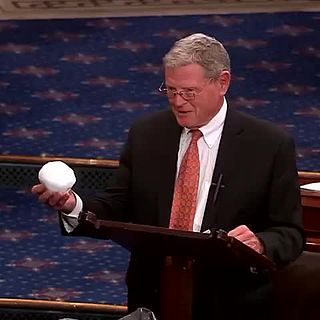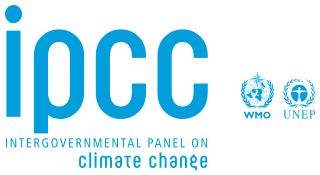Related Research Articles
The Competitive Enterprise Institute (CEI) is a non-profit libertarian think tank founded by the political writer Fred L. Smith Jr. on March 9, 1984, in Washington, D.C., to advance principles of limited government, free enterprise, and individual liberty. CEI focuses on a number of regulatory policy issues, including business and finance, labor, technology and telecommunications, transportation, food and drug regulation, and energy and environment in which they have promoted climate change denial. Kent Lassman is the current President and CEO.

The Hill, founded in 1994, is an American newspaper and digital media company based in Washington, D.C..

Naomi Oreskes is an American historian of science. She became Professor of the History of Science and Affiliated Professor of Earth and Planetary Sciences at Harvard University in 2013, after 15 years as Professor of History and Science Studies at the University of California, San Diego.

References to climate change in popular culture have existed since the late 20th century and increased in the 21st century. Climate change, its impacts, and related human-environment interactions have been featured in nonfiction books and documentaries, but also literature, film, music, television shows and video games.

Climate change denial is a form of science denial characterized by rejecting, refusing to acknowledge, disputing, or fighting the scientific consensus on climate change. Those promoting denial commonly use rhetorical tactics to give the appearance of a scientific controversy where there is none. Climate change denial includes unreasonable doubts about the extent to which climate change is caused by humans, its effects on nature and human society, and the potential of adaptation to global warming by human actions. To a lesser extent, climate change denial can also be implicit when people accept the science but fail to reconcile it with their belief or action. Several studies have analyzed these positions as forms of denialism, pseudoscience, or propaganda.
Tony Bartelme, an American journalist and author, is the senior projects reporter for The Post and Courier in Charleston, South Carolina. He has been a finalist for four Pulitzer Prizes.

Green growth is a concept in economic theory and policymaking used to describe paths of economic growth that are environmentally sustainable. It is based on the understanding that as long as economic growth remains a predominant goal, a decoupling of economic growth from resource use and adverse environmental impacts is required. As such, green growth is closely related to the concepts of green economy and low-carbon or sustainable development. A main driver for green growth is the transition towards sustainable energy systems. Advocates of green growth policies argue that well-implemented green policies can create opportunities for employment in sectors such as renewable energy, green agriculture, or sustainable forestry.

Media coverage of climate change has had effects on public opinion on climate change, as it conveys the scientific consensus on climate change that the global temperature has increased in recent decades and that the trend is caused by human-induced emissions of greenhouse gases.
Alan C. Miller is a Pulitzer Prize-winning American journalist and the founder of the News Literacy Project, a national education nonprofit that works with educators and journalists to offer resources and tools that help middle school and high school students learn to separate fact from fiction. In 2020, NLP expanded its audience to include people of all ages.
Usha Lee McFarling is an American science reporter who is an Artist In Residence at the University of Washington Department of Communication. She won a 2007 Pulitzer Prize for Explanatory Reporting. University of Washington Department of Communication.
Sarah Stillman is an American professor, staff writer at The New Yorker magazine, and Pulitzer Prize-winning journalist focusing on immigration policy, the criminal justice system, and the impacts of climate change on workers. Stillman won a National Magazine Award in 2012 for her reporting from Iraq and Afghanistan and again in 2019 for her article in The New Yorker on deportation as a death sentence. She won a 2012 George Polk Award for her reporting on the high-risk use of young people as confidential informants in the war on drugs, and a second Polk Award in 2021 for coverage of migrant workers and climate change. She also won the 2012 Hillman Prize. In 2016, she was named a MacArthur Fellow. She won a 2024 Pulitzer Prize for Explanatory Reporting for her coverage in The New Yorker about troubling injustices in felony murder prosecutions in the U.S.
Colin Woodard is an American journalist and writer known for his books American Nations: A History of the Eleven Rival Regional Cultures of North America (2011), The Republic of Pirates (2007), and The Lobster Coast (2004), a cultural and environmental history of coastal Maine.
Julie Cart, born in Louisiana, is an American journalist. She won the 2009 Pulitzer Prize for Explanatory Reporting, with her colleague, Bettina Boxall, for their series of stories looking at the cost and effectiveness of combating wildfires in the western United States. She has worked for the Los Angeles Times and several other news organizations. She currently covers environmental issues in the California state capitol as a writer with CalMatters
The history of climate change policy and politics refers to the continuing history of political actions, policies, trends, controversies and activist efforts as they pertain to the issue of climate change. Climate change emerged as a political issue in the 1970s, when activist and formal efforts sought to address environmental crises on a global scale. International policy regarding climate change has focused on cooperation and the establishment of international guidelines to address global warming. The United Nations Framework Convention on Climate Change (UNFCCC) is a largely accepted international agreement that has continuously developed to meet new challenges. Domestic policy on climate change has focused on both establishing internal measures to reduce greenhouse gas emissions and incorporating international guidelines into domestic law.
The term collapsology is a neologism used to designate the transdisciplinary study of the risks of collapse of industrial civilization. It is concerned with the general collapse of societies induced by climate change, as well as "scarcity of resources, vast extinctions, and natural disasters." Although the concept of civilizational or societal collapse had already existed for many years, collapsology focuses its attention on contemporary, industrial, and globalized societies.

Durwood Zaelke is an American environmental litigator, professor, author, and advocate. As President and founder of the Institute for Governance & Sustainable Development (IGSD) in Washington, D.C., and Paris, he currently focuses on fast mitigation strategies to protect the climate, including strategies to reduce short-lived climate pollutants, in the context of the need for speed to limit anthropogenic warming to 1.5 °C.
Elizabeth H. McGowan is an American journalist and author. With David Hasemyer and Lisa Song, McGowan won the 2013 Pulitzer Prize for National Reporting for their report on the Kalamazoo River oil spill.
Lisa Song is an American journalist and author. She won the 2013 Pulitzer Prize for National Reporting, with David Hasemyer and Elizabeth McGowan, for their report on the Kalamazoo River oil spill. She works for ProPublica, reporting on the environment, energy and climate change.

The Sixth Assessment Report (AR6) of the United Nations (UN) Intergovernmental Panel on Climate Change (IPCC) is the sixth in a series of reports which assess the available scientific information on climate change. Three Working Groups covered the following topics: The Physical Science Basis (WGI); Impacts, Adaptation and Vulnerability (WGII); Mitigation of Climate Change (WGIII). Of these, the first study was published in 2021, the second report February 2022, and the third in April 2022. The final synthesis report was finished in March 2023.
Simon Denyer is a British journalist, author, and wildlife conservationist. He served as a foreign correspondent and bureau chief for the Washington Post and for Reuters, including in Beijing, New Delhi, Washington, Islamabad, Nairobi, New York and London.
References
- ↑ "Expert Q&A: The Washington Post's Darryl Fears on covering the environment and his experience as a journalist of color". Planet Forward. 28 August 2020. Retrieved 2021-06-05.
- 1 2 "Darryl Fears". Washington Post. Retrieved 2021-06-05.
- ↑ "Extreme climate change in the United States: Here are America's fastest-warming places". Washington Post. Retrieved 2021-06-05.
- ↑ "The Washington Post's 2°C: Beyond the Limit series recognized for Outstanding Explanatory Reporting by the Society of Environmental Journalists". Washington Post. ISSN 0190-8286 . Retrieved 2021-06-05.